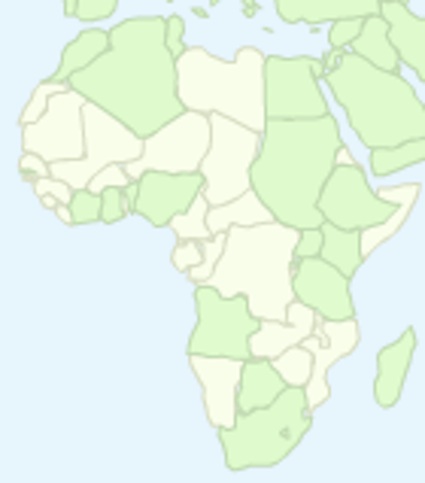I’ve been tracking the countries of origin of Twelve Mile Circle visitors for nearly two years. That shouldn’t be entirely surprising for a website that relies upon geographic content as its primary reason for existence. I’ve reported before that one of my goals is to collect at least one visitor from every country, filling in the geopolitical map. I’ve done extremely well worldwide except for one continent. Africa.
Reviewing the Logs

Countries shaded in green represent visitors to my site. Notice the huge swaths of empty territory. I’m in a bit of a quandary as I try to figure out how I can develop a greater African readership. Obviously, one way to do that would be to increase coverage of geo-oddities in Africa. I do have some already, for example:
- National Capitals Closest Together (Kinshasa, Democratic Republic of the Congo and Brazzaville, Republic of the Congo)
- Likoma and Chizumulu (Malawi)
- What Happened to the Handle? (Namibia)
- Unusual Geography of the Republic of The Gambia
However, even when I’ve feature African content it has never increased visitors from the continent. This contrasts with topics I’ve featured on other continents. Generally a few hits will dribble in from Google searches in the first weeks and sometimes quite a bit more over a sustained period.
Lack of Relevant Topics?
As well, I’m guessing that Twelve Mile Circle may also have a Euro-centric point of view that simply does not resonate with an African audience. Perhaps I should also think of Africa less as a monolith and more as its actual rich tapestry of very distinct cultures and peoples.
I suppose another issue would be that I write this website in English and Africa is a continent of many languages, both traditional and the colonial holdovers. Unfortunately there’s not much I can do about that. I did take a couple of years of French and Spanish during my school years but never gained much proficiency. Running various pages through translation websites won’t work either. The translators have gotten a lot better over the years but they still mangle the language pretty horrifically. As an example, I can use software to translate this paragraph into Swahili.
“Nadhani ingekuwa suala jingine kwamba tovuti hii imeandikwa kwa Kiingereza na Afrika ni bara ya lugha nyingi, wawili wa jadi na holdovers ukoloni. Si kwa bahati mbaya kuna mengi naweza kufanya kuhusu hilo. I did kuchukua miaka michache ya Kifaransa na Kihispania wakati shule yangu miaka lakini kamwe kupata kiasi duni. Mbio mbalimbali kurasa kupitia Tafsiri Nje haitafanya kazi aidha. Ya Watafsiri kuwa Gotten nyingi bora zaidi ya miaka lakini bado mangle lugha pretty horrifically. Kama mfano, naweza kutumia programu ya kutafsiri aya hii katika Kiswahili.”
Translating it Back
However, if I take this Swahili text and translate it back into English it reads,
“I think it would be another matter that this site is written in English and African languages is just the most, two of the traditional and colonial holdovers. Unfortunately not a lot I can do about it. I did take a few years of French and Spanish during my school years but never get much less. Running through the various pages All websites will not work either. Gotten a team that many years better but still pretty horrifically Jingle language. As an example, I can use the program to interpret this paragraph in Kiswahili.”
Well, that doesn’t not seem to be an option. Actually it seems almost insulting.
I’m willing to take suggestions either on a general approach or about specific geo-oddities on the African continent. Please feel free to post a comment if you have any thoughts or recommendations.

Leave a Reply